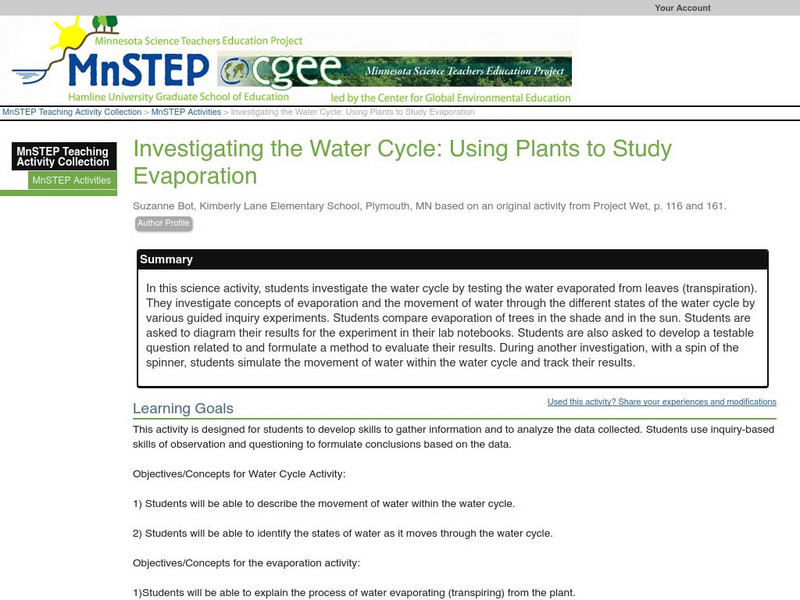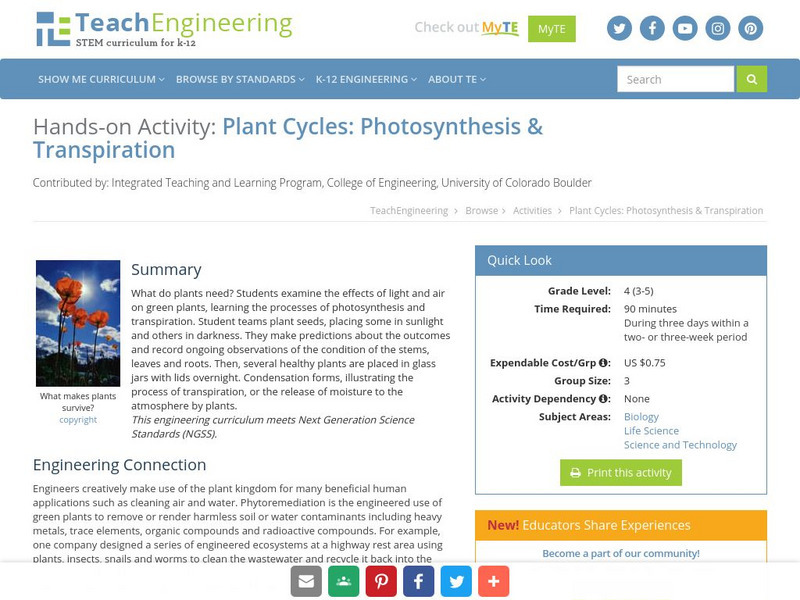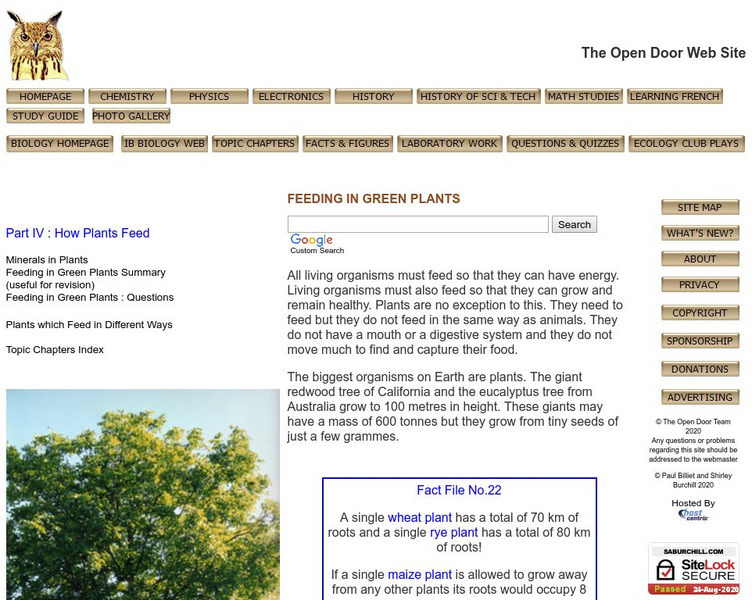Biology Pages
Kimball's Biology Pages: Transportation in Plants
A very good explanation of the processes of water transport in plants. Includes graphics that accompany this very detailed explanation.
Huntington Library
Huntington Library: What Plants Need in Order to Survive and Grow: Air [Pdf]
A lesson unit where learners work in small groups to examine stomata on a leaf's upper and lower surfaces. They then conduct an experiment to test whether plants can survive without air, learning about transpiration in the process.
University of Nebraska
University of Nebraska: Transpiration Water Movement Through Plants
This tutorial examines how water moves through a plant. Follow the pathway that water takes through plants from the roots to evaporation from cells in the leaves. Learn what controls rates of transpiration, how environmental conditions...
Science Education Resource Center at Carleton College
Serc: Investigating the Water Cycle: Using Plants to Study Evaporation
In this science activity, students investigate the water cycle by testing the water evaporated from leaves (transpiration). They investigate concepts of evaporation and the movement of water through the different states of the water...
TeachEngineering
Teach Engineering: Plant Cycles: Photosynthesis & Transpiration
What do plants need? Students examine the effects of light and air on green plants, learning the processes of photosynthesis and transpiration. Student teams plant seeds, placing some in sunlight and others in darkness. They make...
University Corporation for Atmospheric Research
Ucar: Modeling Tree Transpiration
In this activity, learners will observe and measure the water given off through transpiration by a plant in a small terrarium.
Open Door Team
Open Door Web Site: Feeding in Green Plants
Learn how plants absorb water through either root systems or vessels in their stems with this site. Also understand how important water is to the make up of the plant!
Can Teach
A Demonstration of Photosynthesis and Transpiration
Students of all ages wonder what happens to a seed when you plant it in the ground. Try this basic experiment and let them explore, pose questions, and make predictions.
TeachEngineering
Teach Engineering: Witnessing Evaporation
The engineers at Splash Engineering (the students) have been commissioned by Thirsty County to conduct a study of evaporation and transpiration in their region. During one week, students observe and measure (by weight) the ongoing...
BiologyWise
Biology Wise: Types of Photosynthesis
This resource describes three different types of photosynthesis that take place in plants and the plant characteristics and environmental conditions that determine which type takes place.
TeachEngineering
Teach Engineering: Corn for Fuel?!
In this activity, students examine how to grow plants the most efficiently. They imagine that they are designing a biofuels production facility and need to know how to efficiently grow plants to use in this facility. As a means of...
TeachEngineering
Teach Engineering: Planting Thoughts
Students gain an understanding of the parts of a plant, plant types and how they produce their own food from sunlight through photosynthesis. They also learn about transpiration, the process by which plants release moisture to the...
BiologyWise
Biology Wise: Stomata Function
Describes stomata and their functions in photosynthesis, transpiration, and regulation of water retention and loss by plants.
TeachEngineering
Teach Engineering: Biodomes
Students explore the biosphere's environments and ecosystems, learning along the way about the plants, animals, resources and natural cycles of our planet. Over the course of lessons 2-6, students use their growing understanding of...

![Huntington Library: What Plants Need in Order to Survive and Grow: Air [Pdf] Lesson Plan Huntington Library: What Plants Need in Order to Survive and Grow: Air [Pdf] Lesson Plan](https://d15y2dacu3jp90.cloudfront.net/images/attachment_defaults/resource/large/FPO-knovation.png)








